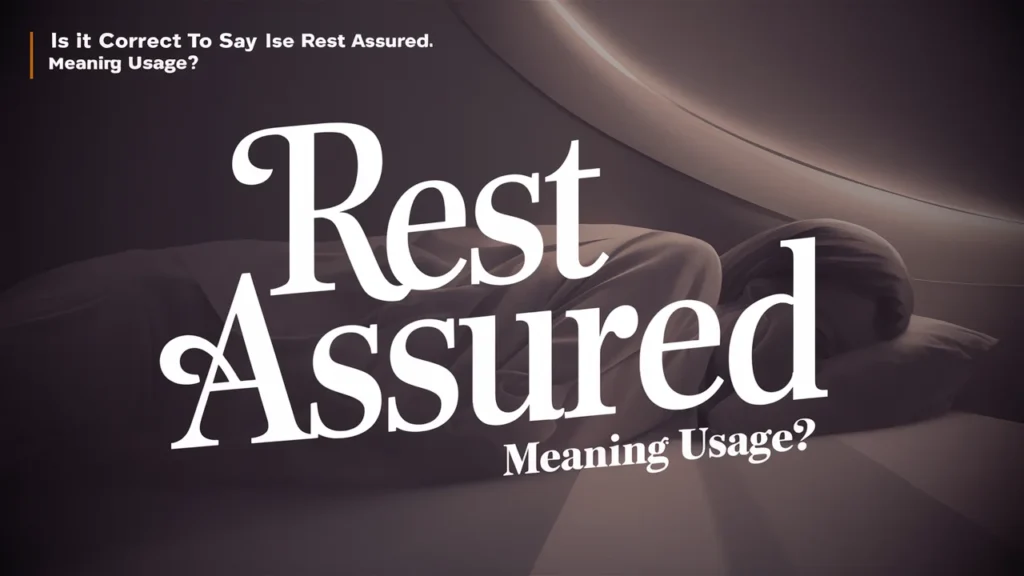When you hear someone say “rest assured,” you might feel reassured yourself, but have you ever stopped to wonder, “Is this phrase actually grammatically correct?” It’s a common expression, often used in both business and casual settings to reassure someone, but is it technically proper English?
Whether you’re crafting a formal email, speaking to a friend, or just trying to navigate the nuances of English, this post will explain everything you need to know about the phrase “rest assured.”
In this article, we’ll cover the meaning of “rest assured,” explore its grammatical correctness, discuss its origin, and dive into when and how you can use it appropriately in both formal and casual contexts. Plus, we’ll look at alternatives and clarify common mistakes people make when using this phrase.
By the end, you’ll have a solid understanding of when and why you can confidently say “rest assured” in your communications, and how to ensure your language is always on point.
What Does “Rest Assured” Mean?
The phrase “rest assured” is commonly used to offer reassurance. But what exactly does it mean? Breaking it down helps clarify how this expression works:
- Rest here doesn’t refer to physical resting, like lying down. Instead, it means remaining or being in a particular state. In other words, it implies a state of confidence or peace.
- Assured means certain or confident. When you tell someone to “rest assured,” you’re essentially telling them to remain confident or certain about something.
So, when you say “rest assured,” you’re telling someone that they can be absolutely certain or confident in whatever you’re assuring them of. It’s a way of calming nerves or reinforcing trust.
Example in Context:
- “Rest assured, your application has been received and is being processed.”
In this example, the speaker is reassuring the listener that everything is in order and that there’s no need to worry.
The phrase provides a sense of security, which is why it’s commonly used in both business correspondence and everyday conversation to reduce uncertainty.
Is It Grammatically Correct to Say “Rest Assured”?
If you’ve ever wondered whether “rest assured” is grammatically correct, the short answer is yes. Let’s explore why.
The Grammatical Structure
In the phrase “rest assured,” we see a passive construction, which is entirely acceptable in English. Here’s a breakdown of how it works:
- Rest in this context is a verb in its base form, which means “to remain” or “to be.”
- Assured is the past participle form of the verb assure, meaning “to make certain or confident.”
While the phrase might feel passive, it is still grammatically correct because it uses the verb “rest” in a way that implies an ongoing state of assurance. It’s important to note that many formal expressions in English use passive constructions (e.g., “It is said that…” or “He is known for…”). So, “rest assured” follows the same pattern and is perfectly fine to use.
Why It’s Used
The passive form adds a level of formality and authority, which is why “rest assured” is often used in professional or official communications. It conveys confidence and assures the reader or listener that something will happen as promised.
For example, a customer service representative might say:
- “Rest assured, your issue will be resolved within 24 hours.”
Here, the use of “rest assured” enhances the tone of professionalism and trustworthiness, creating a positive impression.
Origin and Etymology of “Rest Assured”
Understanding the history behind common phrases can deepen your appreciation for them. So where did “rest assured” come from?
The Historical Context
The phrase “rest assured” dates back to the 16th century. It has its roots in more formal English used in legal and diplomatic contexts, where certainty and clarity were paramount.
In its early uses, the phrase was likely used to provide reassurance in legal or official matters, ensuring that there would be no misunderstandings.
Over time, as English evolved, “rest assured” began to appear in more everyday uses. By the 19th century, it had found its way into more general speech and writing, solidifying its place in modern English as a way to convey trustworthiness.
Though it’s historically formal, the phrase has adapted to various contexts and is still used regularly today, even in casual settings. Its versatility makes it a valuable addition to the English speaker’s toolkit, especially when you want to sound confident and reliable.
Modern Usage: When and How to Use “Rest Assured”
So, when is it appropriate to use “rest assured”? Can it be used in any situation, or are there specific contexts where it’s more effective? Let’s break it down.
Common Scenarios for “Rest Assured”
- Business and Customer Service Communication
One of the most common places where you’ll encounter “rest assured” is in customer service. Whether you’re handling an inquiry, addressing a complaint, or reassuring a client, this phrase works wonders to build trust.
- “Rest assured, we are doing everything we can to resolve the issue.”
This reassures the customer that their concern is being taken seriously.
- “Rest assured, we are doing everything we can to resolve the issue.”
- Professional Emails and Letters
In formal writing, such as professional emails, corporate communication, or business letters, “rest assured” can help soften a message while maintaining professionalism.
- “Rest assured, your project will be completed on time.”
The phrase communicates confidence and reliability, which is vital in professional settings.
- “Rest assured, your project will be completed on time.”
- Reassuring Friends and Family
You don’t need to be in a formal situation to use “rest assured.” It can also be used when speaking to friends or family, especially if you want to offer comfort or alleviate anxiety.
- “Rest assured, everything will work out in the end.”
Here, it serves to calm someone’s nerves, letting them know that they can rely on the outcome.
- “Rest assured, everything will work out in the end.”
Avoid Overusing It
While “rest assured” is handy, don’t overdo it. Like any phrase, using it too frequently can make it sound robotic or insincere. Save it for moments when reassurance is needed, and try to vary your expressions to keep your communication fresh.
Is It Too Formal for Casual Conversation?
You might be wondering, “Is ‘rest assured’ too stiff for everyday conversation?” Great question. Let’s explore that.
Formal vs. Casual Usage
While “rest assured” is generally considered formal, it’s not entirely out of place in casual conversations. The phrase has become more flexible over time, making it accessible in many contexts. However, its formality still gives it a more serious tone.
When to Use Alternatives
If you’re speaking informally and want to avoid sounding overly formal, there are plenty of alternatives. For instance:
- “Don’t worry” – A simple and common reassurance.
- “You can count on it” – Slightly more casual and direct.
- “I’ve got it covered” – A friendly, conversational way to reassure someone.
Choosing the right phrase depends on your relationship with the person and the tone you wish to set. For instance, when speaking to a colleague or boss, “rest assured” might sound just right. But with friends or family, using something more relaxed like “don’t worry” might feel more natural.
Synonyms and Alternative Phrases
It’s always useful to have some alternative expressions at your disposal. If you find yourself using “rest assured” too often, consider these alternatives:
Direct Substitutes:
- “Be assured”
Similar in meaning, though slightly more formal than “rest assured.” - “Trust that”
A direct and reassuring phrase, offering confidence in a more casual manner. - “Have confidence that”
Another solid alternative, emphasizing belief and certainty.
Comparison Table of Formality and Context
| Phrase | Formality Level | Common Context |
| Rest assured | Formal/semi-formal | Business, professional communication |
| Don’t worry | Casual | Informal, personal conversations |
| You can count on it | Neutral | Professional and personal |
| Trust me | Casual | Persuasive, conversational |
When to Use Each Phrase
Choose based on the tone and audience. “Rest assured” works best in formal or business settings, while “don’t worry” or “you can count on it” are perfect for everyday, relaxed conversations.
Common Misconceptions and Mistakes
It’s easy to make mistakes, especially with phrases that have subtle nuances. Here are some common errors people make when using “rest assured”.
Mistake #1: “Rest Assure”
Many people mistakenly say “rest assure” instead of “rest assured.” The correct phrase includes the past participle of “assure,” so it’s always “rest assured” and never “rest assure.”
Mistake #2: Using It in the Wrong Context
While “rest assured” is perfectly fine in most professional or formal settings, it’s best to avoid using it in overly casual situations. In these cases, a more laid-back phrase might be a better choice.
Is “Rest Assured” Still Relevant Today?
In the age of digital communication, where text messages and emails dominate our conversations, is “rest assured” still relevant? The answer is yes, and here’s why.
Digital Communication and Modern Context
Although language trends change, the phrase “rest assured” is still widely used in professional emails, customer service, and other formal contexts. It has the advantage of being clear, polite, and confident—all qualities that are highly valued in communication today.
Conclusion:
In conclusion, the phrase “rest assured” is not only grammatically correct but also an important tool for conveying confidence, certainty, and reassurance. Whether you’re crafting a professional email, offering support to a friend, or simply trying to express trust in a situation, this phrase works wonders.
Now that you understand its meaning, usage, and alternatives, you can use it effectively—and with confidence—whenever the need arises. Keep it in your communication toolbox, but remember to choose your words wisely based on your audience and context.
Frequently Asked Questions (FAQs)
1. Is it correct to say “rest assured”?
Yes, it is grammatically and contextually correct to say “rest assured.” The phrase means “you can be confident” or “you can be certain,” and is often used in both formal and semi-formal settings to offer reassurance.
2. What does “rest assured” mean in simple words?
In simple terms, “rest assured” means “don’t worry” or “you can be sure.” It’s a polite and confident way of telling someone that everything is under control.
3. Is “rest assured” grammatically correct?
No, “rest assured” is incorrect. The proper phrase is “rest assured,” because “assured” is the past participle required to complete the passive construction. Leaving off the “-ed” changes the grammar entirely and makes it incorrect.
4. Can I use “rest assured” in professional emails?
Absolutely. “Rest assured” is frequently used in professional communication, especially in customer service, client relations, and business correspondence. It strikes a good balance between professionalism and reassurance.
Example:
“Rest assured, we are addressing your concern and will follow up shortly.”
5. Is “rest assured” too formal for everyday speech?
It can sound slightly formal, but it’s not out of place in casual conversation. In relaxed settings, though, people often opt for alternatives like:
- “Don’t worry.”
- “Trust me.”
- “You’re good.”
So while it’s not wrong, consider the tone and audience before using it.




